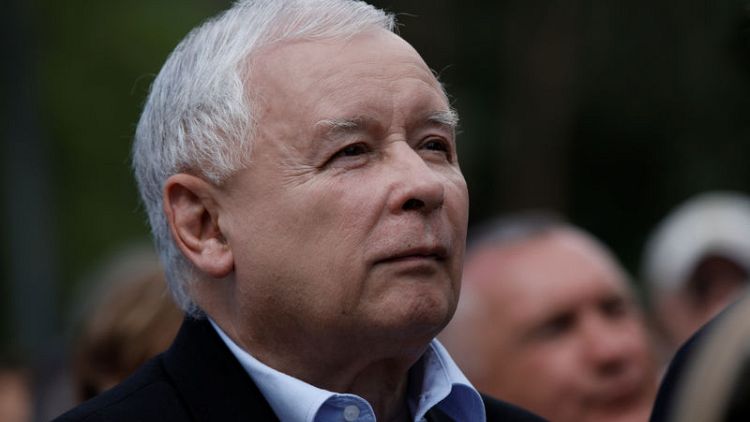By Justyna Pawlak and Anna Wlodarczak-Semczuk
WARSAW (Reuters) - Long cast as a reclusive backstage strategist, Poland's conservative chief Jaroslaw Kaczynski is testing out a new role as charismatic leader as he campaigns to mobilise the rural vote ahead of Sunday's parliamentary election.
Opinion polls show that Kaczynski's Law and Justice Party (PiS), a eurosceptic grouping with a nationalist tilt, is likely to win its second term in office but the turnout in his rural heartland could determine whether it can govern alone or must seek allies among the opposition.
Kaczynski wants a strong mandate for PiS so it can expand anti-liberal policies that have met resistance from its European Union partners, including judicial and social reforms.
Widely seen as Poland's de facto ruler, he has been pulling the strings of government from behind the closed door of his nondescript office building in central Warsaw, holding no official posts other than his lawmaker's mandate as a member of Parliament.
In recent weeks, however, the childless bachelor who reportedly likes to eat lunch alone in his office has instead toured numerous small towns and villages, sampling sausage and quince brandy at PiS-run "family picnics".
With crowds chanting "Jaroslaw! Jaroslaw!", he shook hands and hugged children with an uneasy smile.
"I feel wonderful, I didn't expect something like this to happen to me," said Magdalena Warchol, a 39-year-old shopkeeper who receives the PiS-introduced state subsidy for her three children, during a meeting in Stalowa Wola in central Poland.
Dressed in his trademark dark suit he wears to commemorate his twin brother Lech who died as Polish president in a plane crash over Russia in 2010, Kaczynski had kissed Warchol's hand in an old-fashioned gesture practiced by many men in Poland.
"It's indescribable," she said. "I always vote for PiS."
EYES ON TURNOUT
Back in Warsaw, visiting foreign dignitaries tend to make a stop in his office on Nowogrodzka Street - a central location that has become synonymous with power in Poland's political parlance.
Sparingly furnished, Kaczynski's Nowogrodzka office is where he meets senior government officials, including, occasionally, the prime minister. He visits the government headquarters rarely and only for official events, people close to Kaczynski say.
Kaczynski has cast the election as a chance to finish his grand ambition of correcting Poland's course since the end of communism in 1989. He believes the nation had abandoned its Catholic and patriotic values to please liberal allies in the West.
"We have to defend Poles from a belief that's being forced on them: that to be affluent, to live well, like in the West, you have to be like them. You don't have to," Kaczynski told supporters in southeastern Poland.
"They are going through a sickness, and to demand from us that we let them infect us is asking too much."
What worries PiS is voter complacency. After four years in power, punctuated by scandals in state institutions that had little impact on the party's popularity, PiS is polling around 40-44%, the largest support of any political party in Poland. Its unshakeable popularity stems largely from its massive welfare payouts. It won 37.6% in the 2015 election.
Turnout is traditionally lower in rural areas, where the majority of the core PiS electorate live: less well-off voters whose lives have been improved by the party's flagship child subsidy programme.
"Turnout is extremely important from our point of view. It works to our advantage," Arkadiusz Mularczyk, a senior PiS lawmaker, told Reuters this week. "Polls show PiS has a chance to win but that shouldn't put our voters to sleep. They may be feeling complacent."
PiS officials hope Kaczynski, 70, whose power over PiS is undisputable in Poland, can mobilise voters to get to the ballot box on Sunday.
"His presence during party conventions is incredibly important," Mularczyk said. "Kaczynski appreciates the Polish soul perfectly. His speeches have a broad meaning and reflect our philosophy of governance."
PiS came out on top during the European Parliament election in May, when voter turnout hit a record 45.6% for the Europe-wide vote in Poland, compared with less than 24% five years earlier.
The national vote will take place against a backdrop of mounting political polarisation in Poland. PiS has cast the election as a choice between a fair society that espouses Catholic values and a liberal order that promotes a chosen few and endangers family life.
A survey by IBRIS, pollster for Rzeczpospolita newspaper, showed that only 39% of PiS voters are "very determined" to cast a vote, against 69% of Poles who support the centrist Civic Platform, Poland's main opposition party formerly led by EU Council President Donald Tusk.
More than 90% of supporters of a left-wing bloc, which is polling third, said they are very determined to vote.
(Reporting by Justyna Pawlak and Anna Wlodarczak in Warsaw; Additional reporting Joanna Plucinska and Alicja Ptak in Warsaw; Editing by Matthew Lewis)
